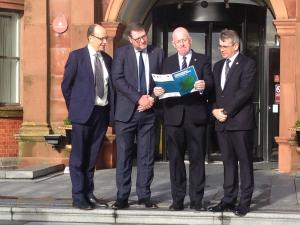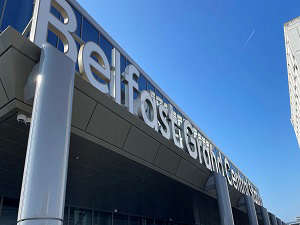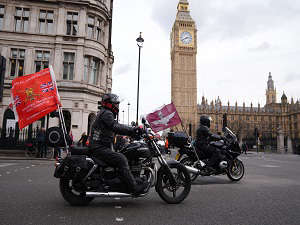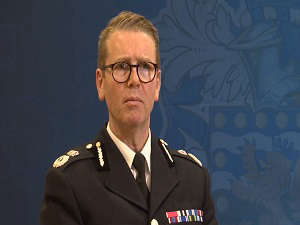
by David Young
Police chiefs on both sides of the Irish border have pledged to find a way to continue co-operation whatever Brexit deal emerges.
Garda Commissioner Drew Harris and Police Service of Northern Ireland Deputy Chief Constable Stephen Martin stressed the importance of maintaining partnership arrangements that are currently facilitated by their respective jurisdictions' membership of the EU.
Mr Harris said it was "inconceivable" that Brexit would bring an end to the close working relationship, while Mr Martin highlighted the need for a new legal framework to ensure ties would not be broken.
They warned against the consequences of a hard border on the island, with Mr Harris cautioning it would create an "emotional driver" that violent dissident republicans would seek to exploit.
Both senior officers were at a cross-border crime conference in Newcastle, Co Down. The event at the Slieve Donard hotel outlined the threats and risks posed by organised crime gangs which operate across the border.
The conference came days after a high-profile use of the European Arrest Warrant in Ireland. Former IRA man John Downey, 66, was detained by gardai in Co Donegal using such a warrant following a request from Northern Ireland authorities, which are seeking to extradite and charge him with the murder of two soldiers in Co Fermanagh in 1972.
Mr Harris said he wanted to see the strong relationship between the police services maintained after March and that senior officers were working together to find ways to plug any "gaps" Brexit might open up.
"We do require the legal underpinnings that would allow us to share information, vehicles like the European Arrest Warrant, all of those are important on the island of Ireland in terms of keeping people safe and the policing service that we provide," he said.
It's inconceivable to me that our co-operation is going to end in March, it's not going to happen, but what we will then have to work with is how do we then find the legislative underpinnings which allow the exchange information etc to carry on."
Asked about the potential of an upsurge in dissident violence if new border structures and checks were a consequence of Brexit, he said: "What we have to work at is to make sure that in effect we don't create the emotional drivers that they would try to tag on to in terms of driving a terrorist campaign.
"It's something they may wish to rally round, undoubtedly they will attempt to do that, but we have to make sure as policing organisations that we don't create any form of emotional driver that they would want to tie into."
Mr Martin stressed the need to find ways of working together whatever form Brexit takes.
He said the PSNI's partnership with the Garda was as strong as it had ever been.
"That does require legislative underpinning," he added. "So we benefit from a range of tools in our tool box. The European Arrest Warrant is the one that people most often talk about but (there is also) access to criminal records, the ability to share intelligence.
"But whatever happens after Brexit at the end of March we want the capacity and capability to do the same thing."
He said the PSNI was concerned about the lack of certainty months from Brexit.
"There's great uncertainty at the moment," he said.
Mr Martin said he took heart from the fact all parties to the Brexit negotiations wanted to find a solution.
"I have no doubt everyone wants to see effective law enforcement, but I don't underestimate the challenges of those political negotiations," he said.
"The uncertainty is unhelpful but we are hopeful that a deal will produce the goods for us.
"No one wants to see a hard border, the border at the moment is seamless, it is frictionless - to use the terms that are often quoted.
"I think a no-deal situation would pose a whole range of complexities and difficulties for us, we would have to work through that. Our partnership would be such that we would do our absolute best but I think a no-deal situation would undoubtedly create difficulty."
Mr Martin said the policing landscape had been transformed from the days of violence that marked his early career in the 1980s.
"I think a hard border, whatever that looks like, if it's different from what it looks like now, will be a backwards step and I think people need to recognise that that backward step would bring complications and difficulties," he said.
Ireland's Justice Minister Charlie Flanagan also attended the opening of the conference. In previous years he would have been accompanied by Stormont's justice minister, but the powersharing crisis in Northern Ireland means no ministers are in post. Stormont's Department of Justice was represented by its permanent secretary Peter May.
Mr Flanagan said he stopped to look for the border on his way to the event.
"I had difficulty finding it," he said.
"I want to ensure that post-Brexit, irrespective of the form that Brexit takes, that the border between north and south will be invisible.
"A hard border on the island of Ireland is inconceivable.
"We have made too much progress in recent years from a political point of view, from an economic point of view and from a social point of view - so there's no going back to a hard border."
He rejected any suggestion that other EU nations might ultimately give ground on their position on the need for a "backstop" mechanism to maintain a soft border.
"I am confident that there is a high degree of support right across the European Union for the Irish priorities, the Irish issues and the Irish question," he said.


 Legal papers lodged in challenge to Irish language signs at Belfast station
Legal papers lodged in challenge to Irish language signs at Belfast station
 Bikers to descend on Westminster for veterans protest against Legacy Act repeal
Bikers to descend on Westminster for veterans protest against Legacy Act repeal
 Guidance sought over future of colourful parakeets in Belfast park
Guidance sought over future of colourful parakeets in Belfast park
 Woman released after questioning over pipe bombs in Co Down
Woman released after questioning over pipe bombs in Co Down
 Suspended chief constable will not be prosecuted over alleged sexual offences
Suspended chief constable will not be prosecuted over alleged sexual offences